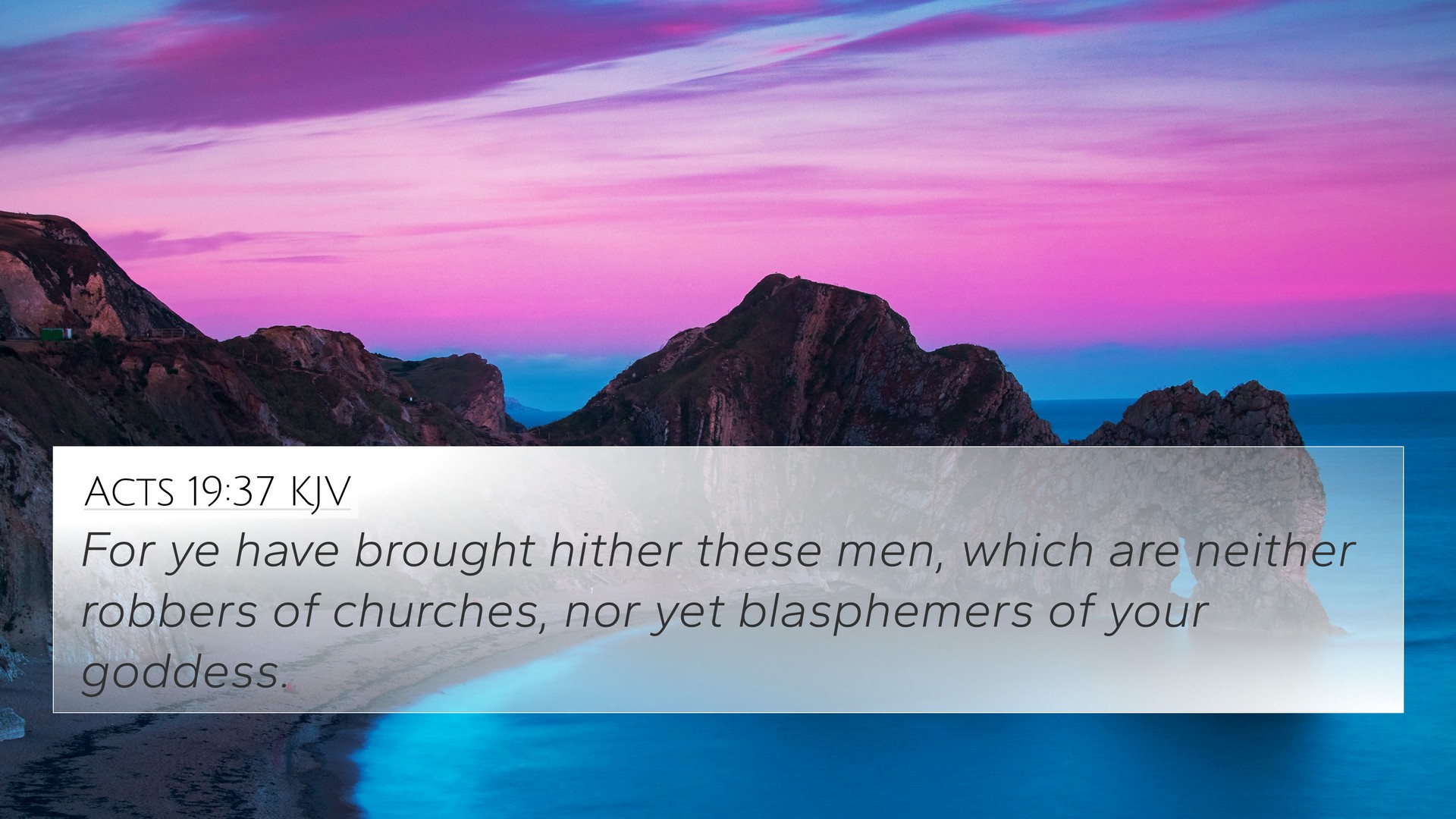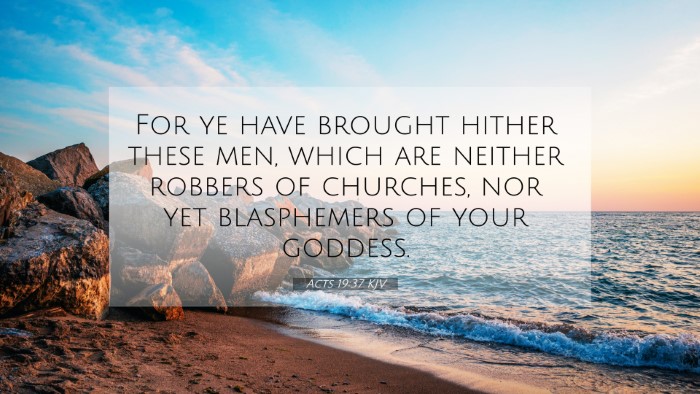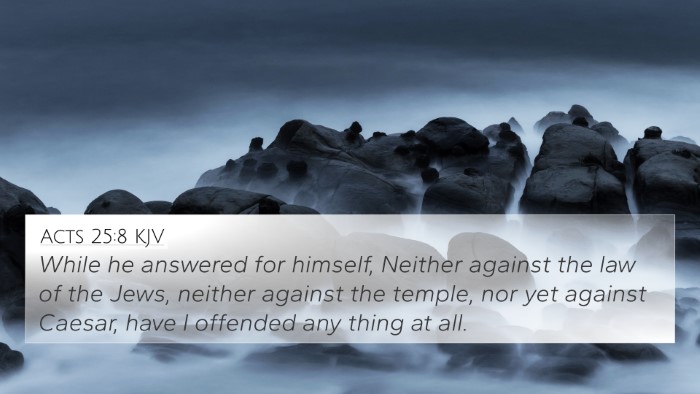Understanding Acts 19:37
Acts 19:37 states:
"For you have brought these men, who are neither robbers of temples nor blasphemers of your goddess."
This verse occurs during a critical moment in the Apostle Paul’s ministry in Ephesus, highlighting the conflict between early Christians and the local artisans who made a living from the worship of Artemis. Understanding this verse requires examining its context and implications, as explained by noted biblical commentators.
Contextual Overview
This passage is part of a larger narrative concerning the uproar in Ephesus, where Paul preached the gospel, leading to significant economic and spiritual upheaval among the local silversmiths, whose profits came from idols. In Acts 19:37, the town clerk addresses the assembly, asserting that the accused (Paul and his companions) have not acted unlawfully.
Commentary Insights
- Matthew Henry: Henry emphasizes the importance of witnessing to the truth of the gospel in adverse situations. He points out that the clerk’s defense of Paul highlights God's providence, protecting his servants even in hostile environments. This serves as an assurance that the gospel is not against the state or lawful practices.
- Albert Barnes: Barnes provides insight into the nature of the charges against Paul. He notes that the accusations were serious yet unfounded since Paul’s teachings did not promote theft or blasphemy. This demonstrates the point that those who preach the gospel may face opposition, but they should remain steadfast as their integrity can shine through unjust allegations.
- Adam Clarke: Clarke discusses the significance of the town clerk's role as the civil authority in Ephesus. He illustrates how the clerk’s words reflect civil justice, showing an understanding of the implications of Paul’s ministry on local trade and culture, fortifying the idea that Christianity is not an enemy of society's laws.
Cross-References
Acts 19:37 is interlinked with several other biblical passages that provide additional layers of meaning:
- Acts 16:20-21: Similar accusations were made against Paul in Philippi, revealing a pattern of resistance faced by missionaries.
- 1 Thessalonians 1:9-10: This letter echoes the transformative power of the gospel that was acknowledged by pagans, indicating a cultural conflict parallel to that in Ephesus.
- 1 Peter 2:12: Peter encourages Christians to live honorably among non-believers, resonating with the theme of maintaining integrity amidst accusations.
- Luke 23:2: Here, Jesus faces similar charges of subversion, highlighting a continual thread of misunderstanding regarding the intent of the gospel.
- Acts 21:28: Paul is accused of teaching against Jewish law, showing how misunderstandings often accompany the preaching of the gospel.
- Romans 13:3-4: Paul teaches about submission to authorities, reinforcing the principle that Christianity supports lawful conduct.
- 2 Corinthians 6:8: Paul speaks about being well-received or misunderstood, a duality experienced throughout his ministry.
Thematic Connections
This verse embodies several broader themes in scripture:
- Persecution and Misunderstanding: Acts 19:37 indicates how the Christian faith may lead to persecution due to misunderstanding (see John 15:18-20).
- The Role of Civil Authority: The town clerk’s actions highlight God using secular leaders to protect His ministers.
- Integrity in Ministry: The defense of Paul emphasizes the necessity of living a life above reproach (Titus 1:6-7).
- Divine Sovereignty: The unfolding events exhibit God working through challenging circumstances to fulfill His purpose (Romans 8:28).
Conclusion
Acts 19:37 serves as a powerful reminder of the challenges faced by early Christians and the importance of maintaining integrity. Understanding this verse requires examining its context, its implications, and its connections to other scriptures through a comprehensive cross-referencing approach. The insights provided by esteemed commentators like Matthew Henry, Albert Barnes, and Adam Clarke facilitate a deeper understanding and showcase how interconnected the Word of God is concerning themes of justice, integrity, and the protection of those who preach the gospel.
Tools for Further Study
For those seeking to engage in further study of the Bible and its verses, the following resources are recommended:
- Bible Concordance
- Bible Cross-reference Guide
- Bible Reference Resources
- Cross-reference Bible Study Methods
- Comprehensive Bible Cross-reference Materials
How to Cross-Reference Bible Verses
Understanding cross-references in the Bible enhances one’s study by revealing hidden connections and parallels. Here are some tips:
- Utilize Bible concordances to locate similar themes or wording.
- Review footnotes in study Bibles that often provide cross-references.
- Engage in thematic Bible verse connections to delve deeper into specific topics.
- Participate in comparative Bible verse analysis by identifying connections between texts.
Inter-Biblical Dialogue
The conversation between Old and New Testament scriptures fosters a richer understanding of God’s message throughout the biblical canon. By examining themes and concepts that bridge these two sections, readers can gain valuable insights into God’s nature and His plan for humanity.






